“I don’t do anything on the internet and my business is doing just fine.”
Is it, though?
Or are you noticing that your regular customers are getting less regular, your print ads are getting more expensive, and you’re not seeing many new faces come through the door?
You’re not alone.
For many established businesses, especially those that have been around since before everyone carried a tiny computer around in their pockets, digital presence and digital marketing seem like an afterthought at most.
That’s a mistake.
Maybe you have a website that someone built for you a while ago, but you don’t know how to maintain it and checking up on it isn’t a priority.
Maybe you use Facebook posts to engage with customers, but you’re hesitant to take the bait when Facebook tells you to boost one.
You think: How much of a difference could paid marketing and digital strategy possibly make?
Well, I’m here to tell you:
The truth is, in 2019, people expect to be able to learn anything and everything about the world around them from the convenience of a smartphone screen.
It’s where they look to find solutions to their problems, discover new places, and research before making purchases.
So it’s where you need to be in order to be noticed.
Why you Need a (Good) Website
Even if you don’t ever look at your website, people who hear about your business do.
And what impression does it give them?
- Is the design plain or out of date?
- Is it unreadable on a mobile device?
- Does it have clearly outdated information on it?
Any one of those things would be a huge problem for user experience, but all three of them together create a website that makes your business look, well, OUT of business.
And that’s terrible for your bottom line.

This is an extreme example, but if your site has anything at all in common with this electric vehicle news site, you need to make some big changes.
The first step in any digital marketing strategy is to give your business a good home on the internet, and this home should be your website.
At the bare minimum, your website needs to:
- Be secure (your URL should start with “https://” instead of “http://”)
- Contain up-to-date information about your business, including accurate NAP (Name, Address, and Phone Number)
- Tell users about the goods and services you offer in detail
- Be usable on phone and tablet screens
- Be fairly visually appealing
- Have pictures (with meta titles and alt tags)
- Have a clear call to action (what do you want users to do after visiting your site?)
- Have a Contact page and privacy policy
- Load quickly (preferably in less than 3 seconds)
This may seem like a lot, but it’s actually quite an easy task with the help of a Content Management System (CMS) like WordPress.org and a few free plugins. Long gone are the days where you need to hand-code a website.
Think of your website as the base of all the things someone could possibly want to know about your business before becoming a customer, and fill out the content as such.
If you don’t think you have the time or technical savvy to learn how to run your own website, consider hiring an agency to do it for you – preferably one that uses a non-proprietary CMS so you can maintain the option take it over on your own in the future.
Side Note: if an agency tells you they use their own CMS that they built themselves, tread carefully. Unless you need a very complex functionality that systems like WordPress can’t handle (which is rare), a proprietary CMS is unnecessary and could trap you in a lifetime contract with a sub-par web developer just to keep your site running.
Once your website is in place, you can set up search engine indexing, analytics and tracking through Google and Bing to monitor how people are finding, using, and navigating around your site. This information can be used to adapt your site to be even more visible and useful.
Why You Need a Google My Business Listing
If you have a brick-and-mortar business location, this is incredibly important to helping walk-in customers find you.
Have you ever done a Google search for a business and noticed that to the right hand side of the results (or at the top of the page on mobile) there is a large information card with details about that business?
Well, you may be surprised to find how easy it is to claim one of those for your own business:
- Google your business’s name.
- If a knowledge card about it comes up, you can claim it right there by clicking the link in the card that says “Own this business?” and following through with the Google My Business account creation process.
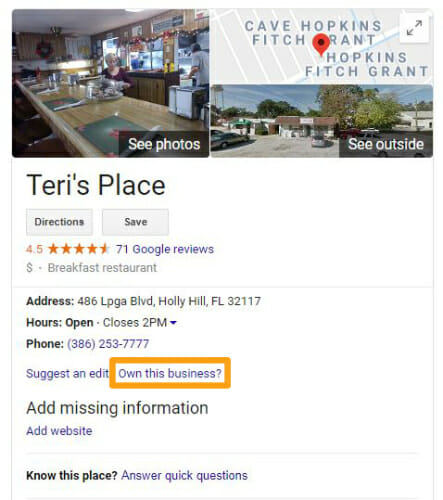
If no knowledge card appears, it means there just wasn’t enough information about your business on the internet for Google to recognize it and assemble information for it. In this case, you can assemble the card from scratch by creating a Google My Business account.
That’s all! You can even add photos and discount offers to your GMB knowledge card to attract more visitors to your business.
Why You Need Analytics
Analytics are both the glue that holds your digital marketing strategy together and the lubricant that keeps it running smoothly.
Their importance cannot be underestimated.
Without analytics for your website, your social media, and your ads, it can be hard to know whether your strategies are working effectively to bring you more customers.
If you’re not seeing results from your digital marketing at your physical business, analytics can help you troubleshoot your online issues and get your strategy back on track.
Because the truth is, if you’ve formulated your digital marketing strategy correctly for your target audience, there’s no way you won’t see results.
The idea of having to install special codes on your website and connect them to charts and graphs on a different website may seem daunting at first, especially if you’re not familiar with the way websites work.
But never fear:
Since analytics platforms want as many people as possible to use their products, they make things as easy as possible for people at all levels of tech literacy to do so.
Facebook Analytics
If you’re advertising on Facebook, your ads account will give you some insights into how your ads are performing on Facebook itself, and your Page will give you insights about how users interact with it as well.
But it’s also possible to track how people act when they move from Facebook to your website:
All you have to do is put something called a “Facebook Pixel” on your site.
The Facebook Pixel is just a piece of code that you or your website manager copy and paste into the header section of your website’s source code (or into a tag in Google Tag Manager, if you use that).
Google Tag Manager is a fairly advanced analytics platform that helps website managers track very specific actions on their website. There’s a bit of a learning curve to it, so unless you already have a strategy in place and some time to commit to it, we suggest letting your web developer handle it or opting for less in-depth options.
Once it’s in place, you can go back into Facebook and configure it to track any number of actions people may take on your site that you want to know more about, including adding a product to their cart or simply viewing content.
If you use Google Chrome as your browser, you can even download the Facebook Pixel Helper extension to test and troubleshoot the functioning of your pixel.
Google Analytics
Google Analytics is another code snippet-based tracker that will help you determine things like how users navigate through your site, which pages they view in what order, what they’re clicking on most often, and more.
You’ll need a Google account to get started on this. Google will also make you create an Analytics account using the same information as your Google account.
Once you’ve made an account, create a property for your website and configure it based on your industry and time zone. Then install the tracking code on your site and voila! You have Analytics!
Google Search Console
Google Search Console is another account that you can set up for your website within Google.
Unlike the analytics platforms we’ve already mentioned, Search Console doesn’t deal with on-site analytics, but rather with how your site appears in search results, i.e:
- When people search for your business name
- When people nearby search for businesses like yours
- When people search for terms related to your business
Note that when you set up your website in search console, you should be sure to add a separate site for every existing version and subdomain of your URL.
So, if your site can be viewed as http://yoursite.com, https://yoursite.com, http://www.yoursite.com, or https://www.yoursite.com, you need to add separate sites for each of them, then specify which one is preferred (we usually go with the https://yoursite.com option, since it’s short and secure)
Bing Webmaster Tools
Believe it or not, there are industries and businesses whose audiences are more likely to use Bing for search than Google.
If you’re in one of those industries, we suggest setting up Bing Webmaster Tools in addition to Google Search Console to get a full view of your search appearance.
If you’ve already set up a Google account for your business, you can use that same profile to log into the Bing platform and set up and verify your site much the same way you did with Search Console.
Why it Will All Be Worth Your Time
I know after reading all this you’re probably thinking:
“This seems like it will take a long time. I’d rather just focus on running my business.”
Well, my counterpoint is simple:
This is an essential part of running your business now.
The world is speeding ever more quickly towards an entirely tech-based future. If you want your business to have any hope of surviving, you need to put forth the effort to keep up.
Otherwise, potential customers will just pass you by, and the only way you’ll run your business is into the ground.
And believe it or not once you start learning how to market your business in a digital world, it becomes increasingly easy to understand each new development in how to do it.
In fact, I bet that if you resolve to become a digital marketer in 2019, you could very well be a digital marketing expert by 2020.
And if you’re still not sure if you can do it on your own, just get in touch with us. We’ll be happy to help.
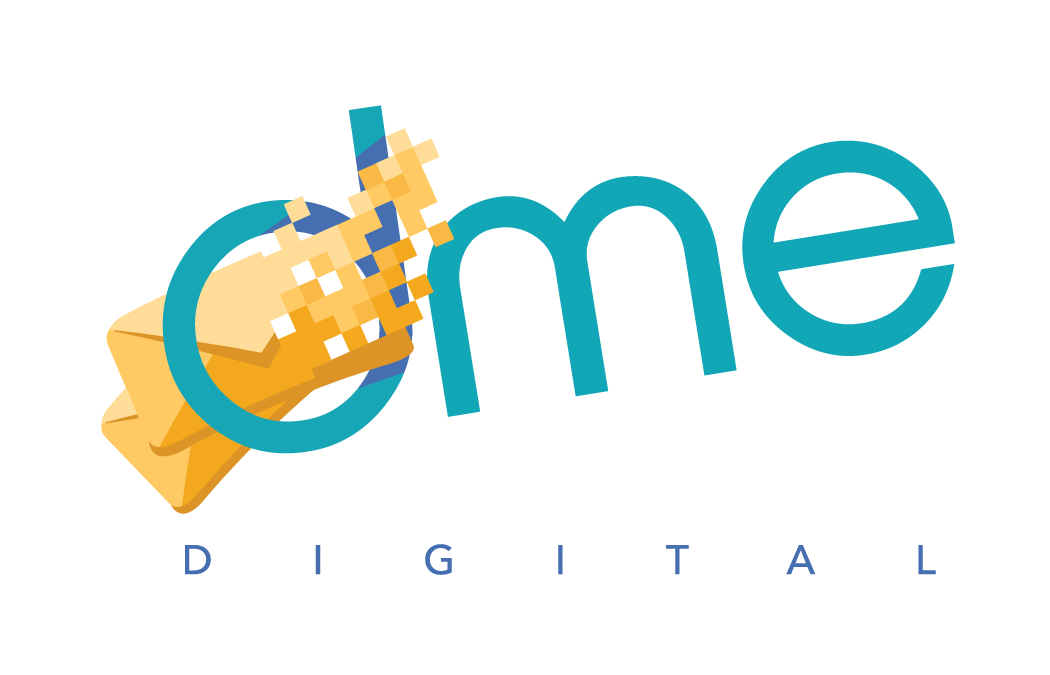

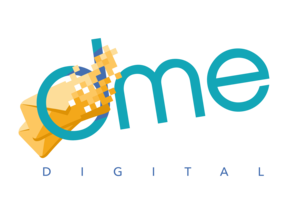

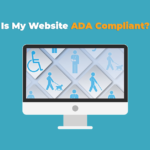

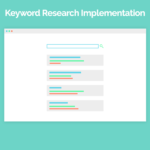





Why You Need Social Media
Users who aren’t finding you on search engines may also be looking for you on sites like Facebook, Instagram, and Twitter.
Not only are these places where people look for updates on businesses they’ve visited and liked, they’re also places where people learn what businesses their friends recommend and trust.
In short, social media is the new word-of-mouth.
When people experience your business and enjoy it, they go to Facebook to find your page and “Like” it or to tag it in a post to tell their friends about it.
If they don’t find it, they can’t like it or tag it, and you lose an opportunity to show up in their feed and their friends’ feeds to remind them that you exist.
Now Facebook even has a feature that allows users to poll their friends for recommendations for businesses within a certain geographic area.
Wouldn’t you love to show up there, too?
You can’t in any meaningful way if you don’t have Facebook for your business.
Other social media platforms such as Twitter and Instagram are also important to have if you want to engage more with your customers and be able to see what they think about you, but Facebook is the true must-have because it has such a wide range of functionalities.
Twitter may be a very beneficial add-on if your audience is mostly young and your business model requires you to give them frequent updates or engagement (think food trucks telling people where they’ll be each day or app-based services providing quick support).
Instagram is great for businesses that have brick-and-mortar locations that their customers visit, as well as for businesses whose products or services are able to be photographed or filmed.
Plus, social media isn’t just about reaching people who already know about your business (or whose friends have told them about it)…
As I mentioned, social media platforms are where people go to find new things to entertain themselves with.
So your social media strategy shouldn’t just focus on people who have already found you:
It should focus on people who don’t even know yet that they’re looking for you.
Not only that, but Facebook won’t even show your posts to all the people who follow you anymore unless you pay for it.
This is for a variety of reasons. Some are good, such as encouraging businesses to post more meaningful content and making sure users see mostly posts from other individuals (as opposed to companies).
But it’s important to remember that Facebook’s business model is based not on individual users, who pay nothing, but rather on advertisers.
The selling point for platforms like Facebook and Twitter is that they know so much about their users:
Because of this, you can easily use social media ad platforms to look at what your current customers and fans have in common, then use that information to target more people who share the same characteristics and interests with an offer that will entice them to become new customers.
Compared to, say, taking out an ad in the local newspaper, this strategy allows you to find people who are much more likely to be interested in your business in particular.
That means each dollar you spend to reach them is more likely to get you a return on your investment.
Facebook also has great resources like Blueprint where you can learn how to follow their ad policies properly and market your business as effectively as possible.
If you want a jump-start understanding the principles of digital marketing in general, I highly recommend downloading the Google Primer app for your smartphone. The lessons are quick and simple enough to flip through anytime, anywhere.